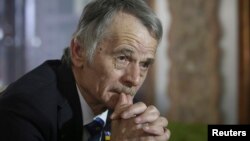The leader of the Crimean Tatars says he wants international peacekeeping forces sent to the Black Sea peninsula, which Russia recently annexed from Ukraine.
Veteran human rights campaigner Mustafa Dzhemilev, served six sentences in Soviet prison camps from 1966 to 1986. He spoke Monday in New York at an informal U.N. Security Council session organized by Lithuania.
After the meeting, Dzhemilev told VOA’s Russian service he feared Crimean Tatars could be the targets of violence under Russian rule, and he would like to see international peacekeepers deployed to Crimea.
“We have serious fears about what can happen there, and asked for the introduction of U.N. peacekeeping forces," he said. "But since that is something decided by the U.N. Security Council, where Russia has the right to veto, this is quite unlikely.”
A second option, Dzhemilev said, would be to send in NATO forces, as was done in Kosovo.
“But the problem with this is that NATO only comes once a sea of blood is shed," he said. "And we are smart enough to want this to happen before they massacre us.
The Crimean Tatars were deported en masse in by Soviet dictator Josef Stalin in 1944 for alleged collaboration with Nazi Germany, and only began returning to their historical homeland on the peninsula in 1991. Today, they comprise 12 percent of Crimea’s nearly two million people.
According to Moscow, more than 96 percent of those who voted in the March 16 referendum voted “for” Crimea’s integration into Russia, and voter turnout was 83 percent.
Dzhemilev insists the turnout was only 32 percent. In addition, he says the Moscow-organized referendum was “absurd" because, in his view, the right of self-determination of a territory belongs only to those who are indigenous to that territory - the Tatars, in the case of Crimea. Yet, they boycotted referendum, he notes.
Russia's U.N. mission boycotted Monday’s informal Security Council session on Crimea, dismissing it as "a biased propaganda show."
Veteran human rights campaigner Mustafa Dzhemilev, served six sentences in Soviet prison camps from 1966 to 1986. He spoke Monday in New York at an informal U.N. Security Council session organized by Lithuania.
After the meeting, Dzhemilev told VOA’s Russian service he feared Crimean Tatars could be the targets of violence under Russian rule, and he would like to see international peacekeepers deployed to Crimea.
“We have serious fears about what can happen there, and asked for the introduction of U.N. peacekeeping forces," he said. "But since that is something decided by the U.N. Security Council, where Russia has the right to veto, this is quite unlikely.”
A second option, Dzhemilev said, would be to send in NATO forces, as was done in Kosovo.
“But the problem with this is that NATO only comes once a sea of blood is shed," he said. "And we are smart enough to want this to happen before they massacre us.
The Crimean Tatars were deported en masse in by Soviet dictator Josef Stalin in 1944 for alleged collaboration with Nazi Germany, and only began returning to their historical homeland on the peninsula in 1991. Today, they comprise 12 percent of Crimea’s nearly two million people.
According to Moscow, more than 96 percent of those who voted in the March 16 referendum voted “for” Crimea’s integration into Russia, and voter turnout was 83 percent.
Dzhemilev insists the turnout was only 32 percent. In addition, he says the Moscow-organized referendum was “absurd" because, in his view, the right of self-determination of a territory belongs only to those who are indigenous to that territory - the Tatars, in the case of Crimea. Yet, they boycotted referendum, he notes.
Russia's U.N. mission boycotted Monday’s informal Security Council session on Crimea, dismissing it as "a biased propaganda show."





